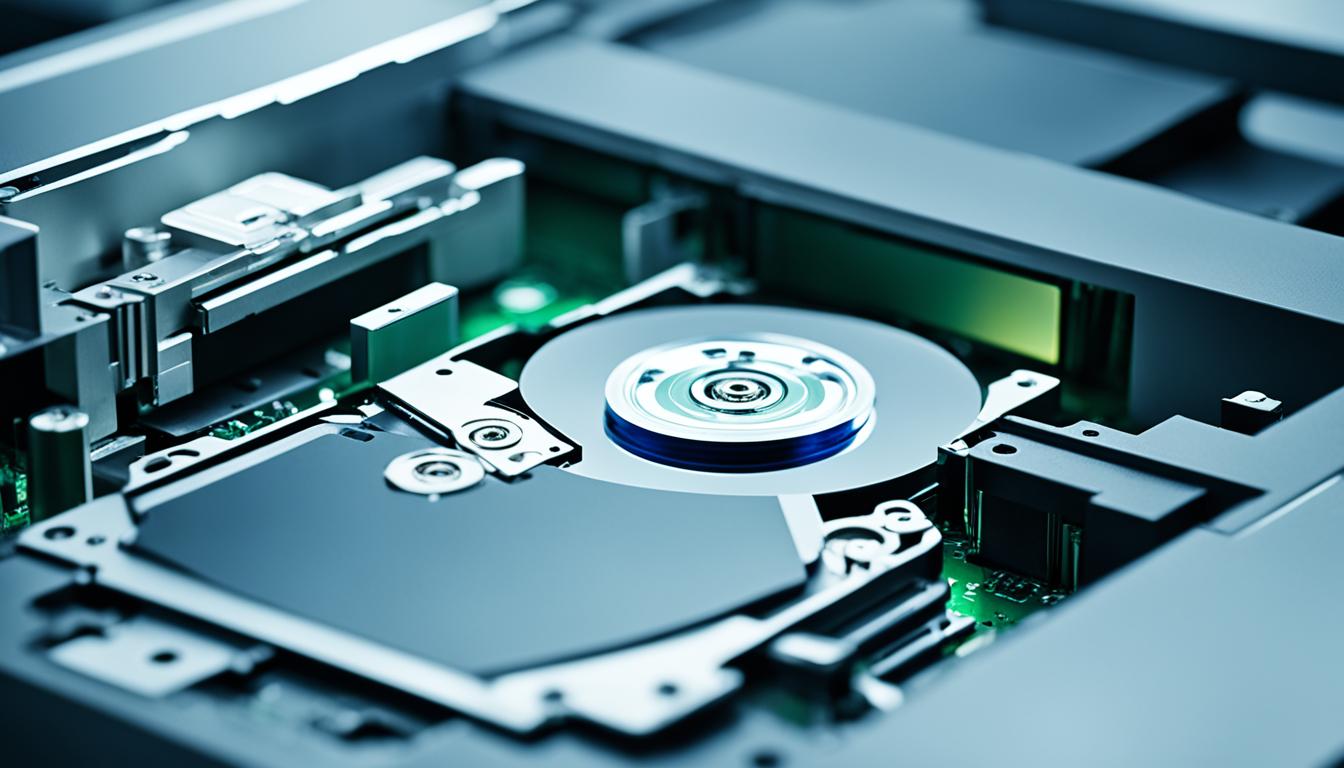The hard drive in a photocopier may seem like a small component, but it plays a vital role in the functionality of these machines. Understanding the purpose and use of a hard drive in photocopiers is essential for businesses and individuals who rely on these devices for their document processing needs.
So, what exactly does the hard drive do in a photocopier? Essentially, it functions as a storage medium for the copier to store and process data related to the documents being copied, printed, scanned, faxed, or emailed. The hard drive ensures efficient operation by managing the vast amounts of information that pass through modern digital copiers and multifunction peripherals (MFPs).
Moreover, the hard drive in a photocopier can contain sensitive data such as social security numbers, credit checks, business plans, and health records. Therefore, it is crucial to have proper security measures in place to protect this information from theft or unauthorized access.
Key Takeaways:
- The hard drive in a photocopier is responsible for storing and processing data related to document processing.
- It acts as a storage medium for large amounts of information passing through modern digital copiers and MFPs.
- Proper security measures are necessary to protect sensitive data stored on copier hard drives.
- The hard drive can contain valuable information, making it a potential target for theft and unauthorized access.
- Implementing security measures and following data protection regulations are essential for safeguarding sensitive information.
Importance of Copier Hard Drive Security
The security of copier hard drives is of utmost importance for businesses today. With the increasing risks of data breaches, identity theft, fraud, and corporate espionage, organizations need to prioritize the protection of sensitive information stored on copier hard drives. The Federal Trade Commission (FTC) has emphasized the significance of implementing robust security measures to safeguard client data and ensure compliance with regulatory requirements.
Companies must establish comprehensive policies and procedures to enhance copier hard drive security and restrict access to confidential data. By doing so, they can mitigate the potential risks associated with unauthorized access and protect the privacy and trust of their clients and stakeholders. Implementing the right security measures is vital for maintaining data security in photocopiers and safeguarding sensitive information.
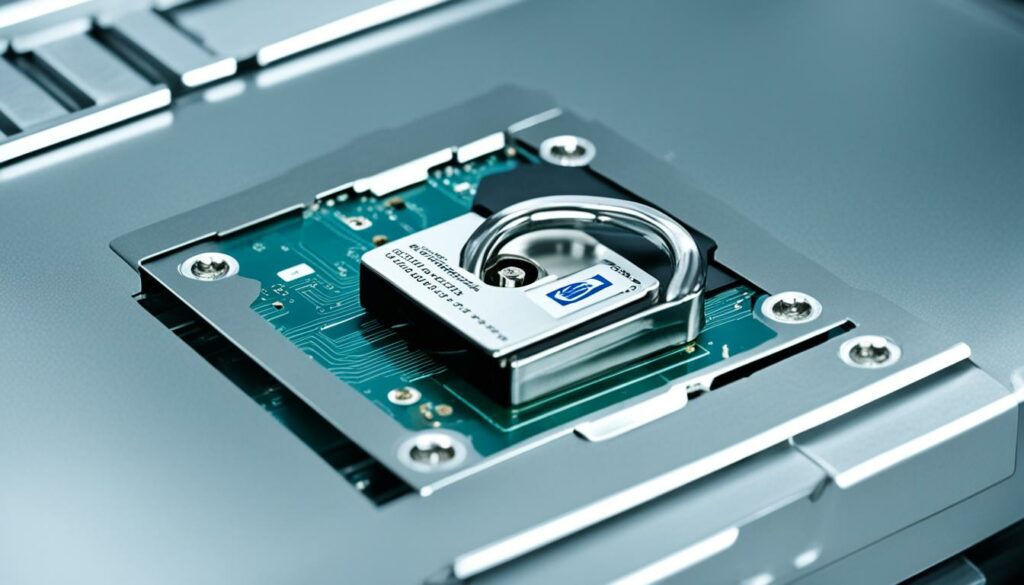
Role of Copier Hard Drives in Document Storage and Printing Processes
The hard drive in a photocopier plays a vital role in the efficient storage and printing processes of documents. It serves as a repository for storing crucial data associated with the documents that undergo copying, printing, scanning, faxing, or emailing. Without the hard drive, the photocopier would lack the capability to process and organize the extensive volume of data flowing through it.
When documents are fed into the photocopier, the hard drive stores various pieces of information related to these documents. This data includes essential details such as time stamps for different jobs, phone numbers for faxes, email addresses, and log files. By retaining this information, the hard drive enables the photocopier to perform its tasks effectively and provide users with accurate feedback on the progress of their jobs.
| Role of Hard Drives in Copiers | Document Storage in Photocopiers | Printing Processes in Photocopiers |
|---|---|---|
| Processing and organizing data in photocopiers | Ensuring efficient storage of all copied, printed, scanned, faxed, or emailed documents | Facilitating smooth printing operations and providing accurate feedback on job progress |
| Storing time stamps, phone numbers, email addresses, and log files | Retaining important information about the documents for future reference | Enabling the photocopier to deliver high-quality prints in a timely manner |
| Playing a crucial role in document management within the copier | Simplifying the retrieval process of previously copied or printed documents | Enhancing overall productivity and user experience |
While the copier hard drive greatly contributes to efficient document storage and printing processes, it is important to remember that the data it holds can be accessed and retrieved if proper security measures are not in place. Protecting the information stored on the hard drive is crucial to maintain the confidentiality and integrity of sensitive documents and prevent unauthorized access or data breaches.
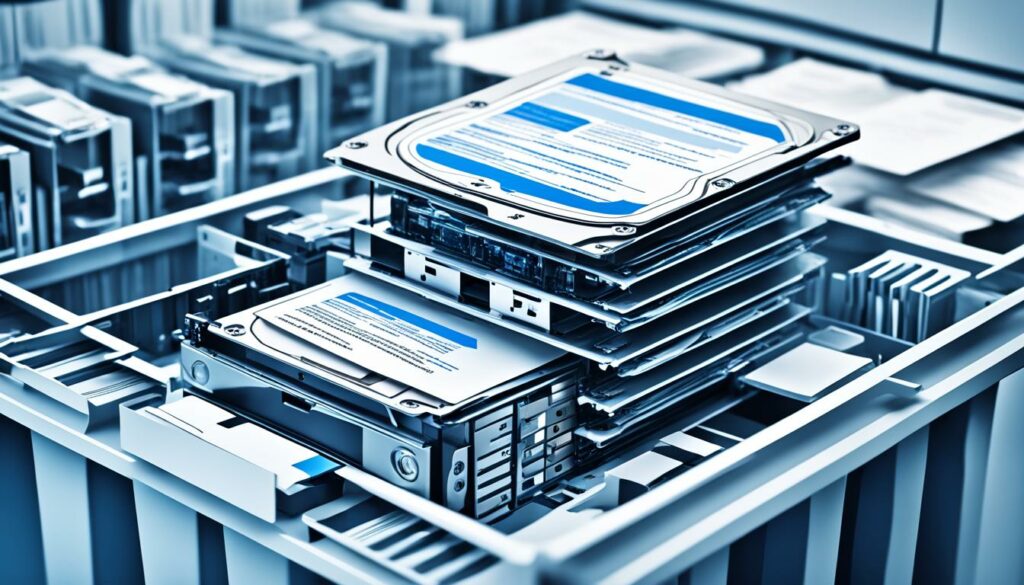
Data Security Measures for Copier Hard Drives
Ensuring the security of copier hard drives is of utmost importance for businesses. Implementing effective data security measures can help prevent data breaches, protect sensitive information, and maintain compliance with data protection regulations. Here are some key steps businesses can take to secure their copier hard drives:
- Implement Encryption: Encrypting the data on copier hard drives can provide an added layer of protection. It ensures that even if the hard drive is accessed without authorization, the information stored on it remains unreadable and unusable.
- Enable Secure Erase: Securely erasing data from copier hard drives before disposing of the machine is critical to prevent potential data leaks. By using government-level security protocols or specialized software, businesses can ensure that all data is permanently removed from the hard drive.
- Implement Password Protection: Setting up password protection for copier hard drives helps restrict access to authorized personnel only. This prevents unauthorized individuals from accessing and extracting sensitive information from the hard drive.
- Regularly Update Firmware: Keeping copier firmware up to date is crucial for addressing any security vulnerabilities and ensuring the latest security patches are in place. Regular firmware updates help safeguard against potential security breaches.
- Train Employees: Educating employees about data security best practices is essential. By providing training on secure handling of documents, proper disposal methods, and the importance of protecting sensitive information, businesses can create a culture of data security awareness.
Implementing these data security measures can significantly enhance the protection of copier hard drives and minimize the risks of data breaches and unauthorized access to confidential information. By prioritizing copier hard drive security, businesses can safeguard their data, maintain customer trust, and avoid legal and reputational consequences.

Types of Security Measures for Copier Hard Drives
Implementing robust security measures for copier hard drives is crucial to protect sensitive data and prevent unauthorized access. Here are some types of security measures that can be implemented:
1. Hard Drive Encryption
Hard drive encryption is an effective security measure that protects data stored on copier hard drives. It uses algorithms to convert data into unreadable ciphertext, ensuring that only authorized individuals with the decryption key can access the data. Encrypting copier hard drives adds an additional layer of protection against data breaches and unauthorized access.
2. Secure Erase of Copier Hard Drives
When disposing of a copier or replacing the hard drive, it is essential to securely erase the data stored on the hard drive. Secure erasing permanently removes all data from the hard drive, making it unrecoverable. This prevents any potential leaks of sensitive information and ensures that the copier hard drive is clean when it leaves your organization.
3. Password Protection for Copier Hard Drives
Implementing password protection is a simple yet effective security measure for copier hard drives. By setting up strong passwords, you can restrict access to sensitive data stored on the hard drive. Password protection prevents unauthorized users from accessing and tampering with confidential information, adding an additional layer of security to your copier.
Implementing multiple security measures, such as hard drive encryption, secure erase, and password protection, provides a comprehensive approach to securing copier hard drives and safeguarding sensitive data.
| Security Measure | Advantages |
|---|---|
| Hard Drive Encryption | – Protects data from unauthorized access – Adds an extra layer of security |
| Secure Erase | – Ensures permanent deletion of data – Prevents data leaks during disposal |
| Password Protection | – Restricts access to sensitive data – Enhances overall security |
Implementing a combination of these security measures provides robust protection for copier hard drives and the confidential information they store.
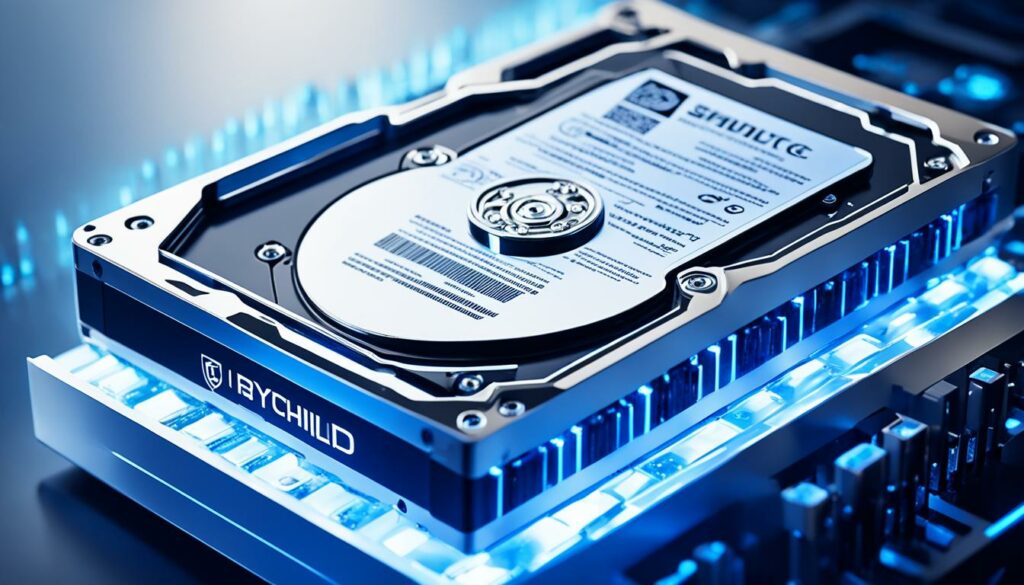
Potential Risks and Implications of Unsecured Copier Hard Drives
Unsecured copier hard drives pose significant risks to businesses. If proper security measures are not in place, sensitive data stored on the hard drives can be stolen or accessed by unauthorized individuals. This can lead to data breaches, identity theft, fraud, and corporate espionage. It is essential for businesses to be aware of these risks and take proactive steps to secure their copier hard drives to protect their clients, employees, and confidential information.
As technology advances, the storage capacity of copier hard drives increases, making them vulnerable to potential data breaches. A single unsecured copier hard drive can contain a massive amount of sensitive information, such as customer records, financial data, and intellectual property. Cybercriminals and malicious actors target copier hard drives as a potential treasure trove of valuable information.
One of the most significant risks of unsecured copier hard drives is the potential for data breaches. Unauthorized access to sensitive data can result in severe financial and reputational damages for businesses. Data breaches can lead to legal consequences, loss of customer trust, and hefty regulatory fines.
“Unsecured copier hard drives can become a goldmine for data thieves, allowing them to access highly sensitive information without detection. Businesses must treat copier hard drive security as a top priority.”
Identity theft is another grave concern associated with unsecured copier hard drives. Personal and confidential information stored on copier hard drives can be used by criminals to assume someone's identity and carry out fraudulent activities. This can have devastating consequences for both individuals and businesses.
- Financial loss: Identity theft can result in significant financial losses for individuals and businesses. Stolen credit card information, social security numbers, and banking details can be exploited by criminals.
- Reputational damage: Businesses that fail to protect the sensitive data of their customers and employees risk significant reputational damage. A data breach caused by an unsecured copier hard drive can erode trust and loyalty.
- Legal implications: Failure to secure copier hard drives and protect sensitive information can lead to legal consequences. Data protection laws and regulations require businesses to implement appropriate security measures and safeguard personal data.
- Operational disruptions: Discovering a data breach caused by an unsecured copier hard drive can result in operational disruptions. Businesses may need to allocate significant resources to investigate the breach, notify affected individuals, and implement remediation measures.
It is essential for businesses to understand the potential risks and implications of unsecured copier hard drives. By implementing robust security measures, such as encryption, secure erasing, and stricter access controls, businesses can significantly minimize the risks of data breaches, identity theft, and unauthorized access to confidential information.
Protecting Data on Copier Hard Drives: Best Practices
Implementing the following best practices can help businesses protect data on copier hard drives:
- Encryption: Encrypting data stored on copier hard drives adds an additional layer of protection. Even if the hard drive is accessed, the encrypted data remains unreadable without the decryption key.
- Secure erasure: Before disposing of a copier, ensure all data on the hard drive is securely erased or destroyed. This prevents unauthorized access to sensitive information.
- Access controls: Implement strict access controls to ensure that only authorized individuals can access the data stored on copier hard drives. Regularly review and update access permissions to prevent unauthorized access.
- Regular audits and monitoring: Conduct regular audits and monitoring to detect any suspicious activities or signs of potential data breaches. Timely detection allows for prompt action to mitigate risks.
- Employee training: Educate employees about the risks of unsecured copier hard drives and the importance of data security. Implement training programs to raise awareness and promote responsible data handling practices.
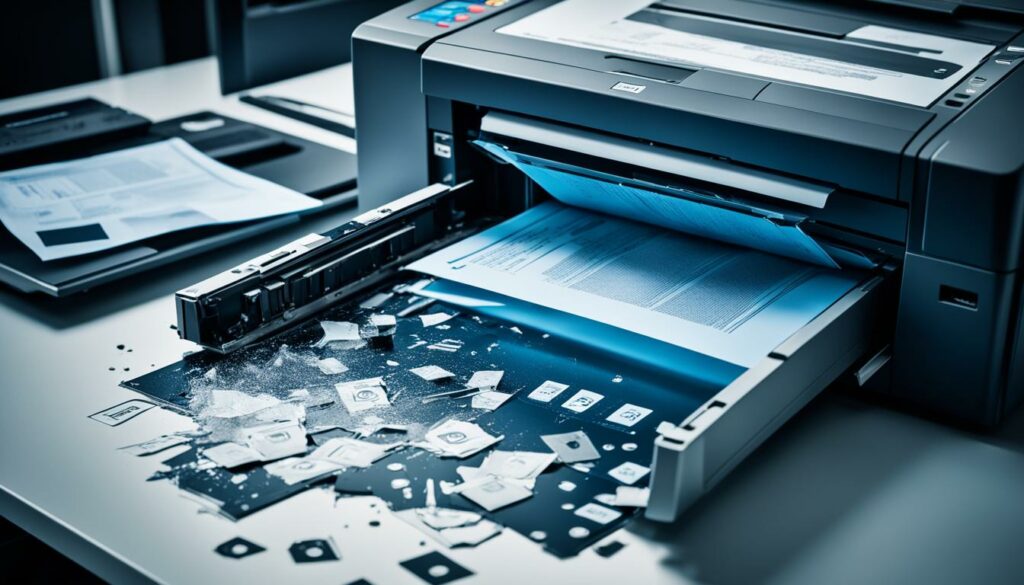
Forensic Analysis of Photocopier Hard Drives
Forensic analysis of copier hard drives has revealed valuable data that can be recovered from these devices. Studies demonstrate the ability to retrieve a wealth of information, such as:
- Time stamps: Details regarding the timing of various jobs processed by the photocopier.
- Phone numbers: Records of fax numbers associated with the copier's usage.
- Email addresses: Information related to email correspondence conducted through the copier.
- Log files: A comprehensive history of activities performed on the photocopier.
- Replica documents: Exact replicas of documents saved in PDF format on the hard drive.
| Data Recovered | Description |
|---|---|
| Time Stamps | Records the timing of various photocopying jobs. |
| Phone Numbers | Logs fax numbers used with the copier. |
| Email Addresses | Stores information related to email communication via the copier. |
| Log Files | Comprehensive record of activities performed on the copier. |
| Replica Documents | Exact copies of documents saved as PDFs on the hard drive. |
This valuable data can be accessed using forensic software programs, highlighting the potential security vulnerabilities if proper precautions are not taken to secure copier hard drives. The forensic analysis of photocopier hard drives serves as a stark reminder of the importance of safeguarding sensitive information and implementing robust security measures.
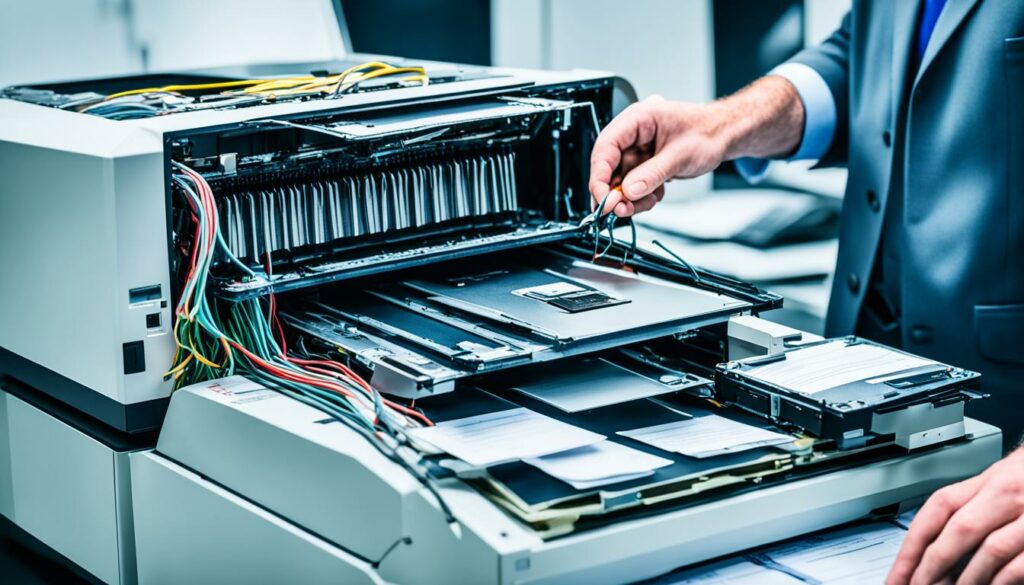
Importance of Proper Disposal of Copier Hard Drives
Proper disposal of copier hard drives is of utmost importance to ensure the prevention of data leaks and unauthorized access to sensitive information. When it comes to getting rid of a copier, simply discarding it without taking proper precautions can put your business at risk of a data breach. To safeguard your organization's data and protect the privacy of your clients, it is crucial to follow secure disposal practices.
There are two primary methods for disposing of copier hard drives securely. The first method is to securely erase the hard drive using government-level security protocols. This involves completely wiping all data from the hard drive, ensuring that it is irretrievable. By doing so, you can eliminate the risk of data leaks and unauthorized access to confidential information.
The second method involves physically destroying the copier hard drive. This method ensures that the data cannot be recovered by any means. By physically destroying the hard drive, you provide an additional layer of security, reducing the risk of data breaches and potential security breaches.
To ensure that copier hard drives are disposed of properly and securely, it is advisable to partner with reputable companies that offer certified destruction services. These companies specialize in the secure destruction of copier hard drives and follow strict protocols to guarantee the proper disposal of sensitive information.
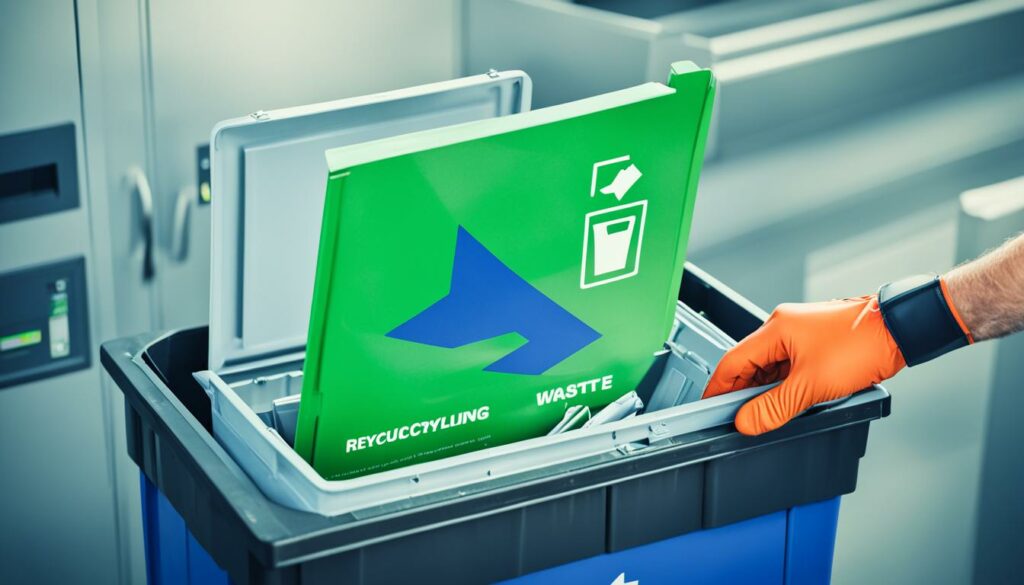
Securely disposing of copier hard drives not only prevents data leaks but also ensures compliance with data protection regulations. By adopting proper disposal practices, businesses can safeguard sensitive information, protect their reputation, and avoid legal consequences.
Compliance with Data Protection Regulations
When it comes to copier hard drive security, businesses must prioritize compliance with data protection regulations. One important regulation to consider is the Gramm-Leach-Bliley Act, which requires certain companies to explain their information-sharing practices and safeguard sensitive data. Although this act primarily focuses on the financial industry, it serves as a valuable policy for all businesses that handle sensitive company, customer, and employee data.
Adhering to data protection regulations is crucial for safeguarding sensitive data in copiers and avoiding legal and reputational consequences. By implementing robust security measures for copier hard drives and following best practices, businesses can establish a secure environment for their data.
| Data Protection Regulations for Photocopiers | Compliance with Data Security Laws | Safeguarding Sensitive Data in Copiers |
|---|---|---|
| Gramm-Leach-Bliley Act | Explanation of information-sharing practices | Securing sensitive data in copiers |
| Industry-specific regulations | Legal obligations for data security | Prevention of unauthorized access to data |
| General data protection laws | Protection of personal and confidential information | Compliance with data privacy requirements |
By staying informed about data protection regulations, businesses can ensure they are in compliance and avoid potential pitfalls. It is recommended to consult legal experts or data protection authorities to understand the specific regulations applicable to their industry and take appropriate measures to safeguard sensitive data.
Conclusion
In conclusion, the security of copier hard drives is of utmost importance for businesses. These hard drives not only store and process sensitive data but also hold the potential for significant risks if not properly secured. To protect sensitive information and comply with data protection regulations, businesses must prioritize the security of copier hard drives.
Implementing robust security measures such as encryption, secure erasing, password protection, and proper disposal can greatly enhance the security of copier hard drives. Encryption ensures that data on the hard drive cannot be accessed without the proper decryption key. Secure erasing permanently removes all data from the hard drive, making it unrecoverable. Password protection adds an extra layer of security by restricting access to authorized individuals. Proper disposal, either through certified destruction services or physical destruction, ensures that the data cannot be retrieved.
By taking these proactive steps to secure copier hard drives, businesses can effectively mitigate the risks of data breaches, identity theft, and unauthorized access to confidential information. Safeguarding sensitive data not only protects the privacy and trust of clients, employees, and stakeholders but also helps businesses avoid legal and reputational consequences. Therefore, it is imperative for organizations to recognize the importance of securing copier hard drives and implement the necessary security measures to ensure data integrity and protection.

I'm Morgan, the creator of VPNForMe — a site born from too many hours spent side-eyeing sketchy VPN reviews and buffering videos.
I wanted a place where people could get straight answers about privacy, streaming access, and which VPNs actually deliver — without the hype or tech jargon.

